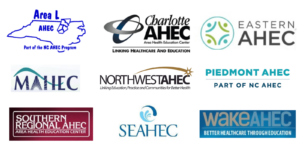Carolina Geriatric Workforce Enhancement Program

With a five-year grant from HRSA (the Health Resources and Services Administration), the Center for Aging and Health at UNC seeks to integrate geriatrics into primary care and expand interprofessional education in geriatrics via the Carolina Geriatric Workforce Enhancement Program (CGWEP). Since 2010, continuing Geriatrics education through the CGWEP and its predecessor, the Carolina Geriatric Education Center (CGEC), has trained over 58,000 health professionals from all levels in medicine, nursing, pharmacy, social work, public health, dentistry, allied health, and health administration.
Leadership
CGWEP leadership is provided by the UNC School of Medicine’s Center for Aging and Health. Jan Busby-Whitehead, MD, is the program director and principal investigator. Ellen Roberts, PhD, MPH, serves as the CGWEP’s co-director. Denisé Dews, MSW, is the associate director of the CGWEP. Visit the Meet our Staff page to learn more.
Partners

Partners include East Carolina University College of Nursing, the NC Area Health Education Centers (AHEC) Program and all nine regional AHEC partners covering 100 counties in North Carolina. Continuing education for health care professionals and families is provided by Area L, Charlotte, Eastern, Mountain, Northwest, Piedmont, Southern Regional, Southeast and Wake AHECs.
Furthermore, partnerships with the North Carolina Division of Aging and Adult Services and various UNC Schools (Medicine, Nursing, Social Work, Dentistry, Pharmacy, and Public Health) help the CGWEP build bridges between the clinic and the community.
Clinical Priorities
The Carolina Geriatric Workforce Enhancement Program reaches out to primary care practices to ensure every provider has geriatrics knowledge. The CGWEP has 5 clinical priorities:
Decreasing the incidence of falls in primary care and presenting to the emergency room
Falls is a quality measure that has long been a goal of the CGWEP. Between 2010 and 2015 we partnered with Mountain AHEC and Physical Therapy faculty from Western Carolina University. In this partnership, we implement standardized falls risk screening for all patients over the age of 65 in three physician practices in western North Carolina. During the summer of 2012 we successfully reported an increase of 37% in falls screening rates. Specifically, this demonstrated improvement in practice and ultimately outcomes. As a result, our research results were featured in two posters at the Gerontological Society of America.
Increasing the use of advance care planning
In Wilmington, our partners at Southeast Area Health Education Center increased the number of older adults who have advance care planning conversations with their providers. In addition, we also scanned written documents into each patient’s electronic health records or a billed advance care planning visit. We have expanded this project to 51 clinics in the UNC Physicians Network.
Decreasing high risk medications like opioids and benzodiazepines
With additional funding from the Centers for Disease Control, the CGWEP partners with the UNC School of Pharmacy to reduce long-term use of these medications. In general, opioids and benzodiazepines hold a higher falls risk for older adults. This project randomizes primary care clinics into two arms: The intervention clinics receive additional consultation from expert Pharmacists from the UNC CAMP team. Concurrently, the control clinics pursue usual care. Consequently, we expect this research to show reduced prescribing of these drugs. In addition, we anticipate a reduced rate of falls for patients at the intervention clinics.
Improving the number of dementia caregivers who receive education and referrals to services
In partnership with the NC Division of Aging and Adult Services, the CGWEP has increased the number of caregivers being referred to the Family Caregiver Support Program across the state.
Decreasing the number of patients with out of control diabetes (A1C higher than 9)
The CGWEP partners with Piedmont Health Services, Inc, a federally qualified health center serving rural and low income patients. The specific goal is reducing the percentage of diabetic patients with out of control A1Cs. As part of this intervention, Geriatricians, Family Medicine Physicians, Advance Practice Providers, Nurses, and Nutritionists have team up to implement the American Diabetes Association Clinical App. In addition, interprofessional healthcare providers receive telementoring on managing their diabetic patients. This takes place via regular videoconferencing meetings with endocrinologists and other experts.